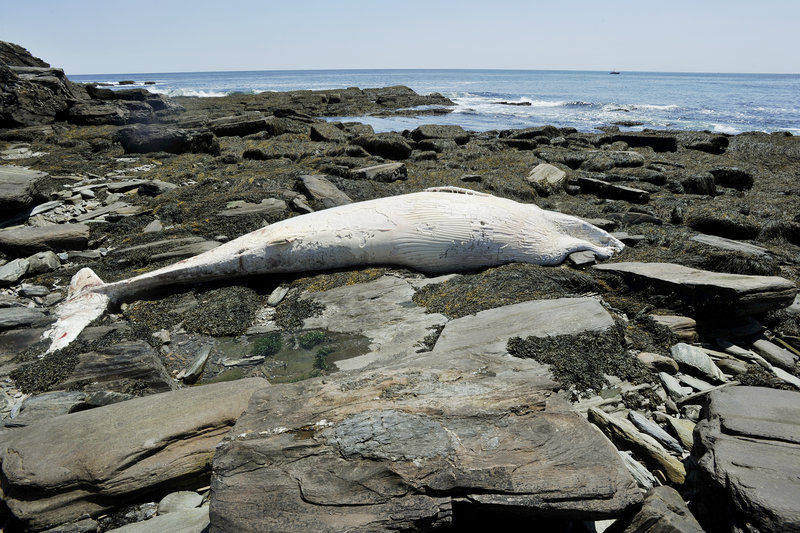The carcass of a 27-foot-long minke whale that washed up on the shores of Cape Elizabeth will remain on the town’s rocky shoreline until the ocean washes it out to sea.
Marine mammal experts, who inspected the whale’s carcass, said it is too decomposed to take tissue samples.
It will likely never be known why the whale died at sea and floated onto the rocks near Two Lights State Park.
Lynda Doughty, executive director of the newly formed Marine Mammals of Maine, said her agency was notified by a state park ranger around 10 a.m. Thursday.
Doughty estimated the whale probably died at sea several weeks ago. It came ashore Thursday.
“It’s too far gone to get any (tissue) samples. We’ve decided to leave the whale there and let Mother Nature take its course,” Doughty said.
Jeanne Curran, a spokeswoman for the Maine Department of Conservation, said the whale’s body is on private property near the boundary with the state park. Curran said a ranger notified Marine Mammals of Maine that there was a dead whale on the rocks near the park.
Because the animal is on private property, the state park staff can not keep curiousity seekers from trying to view the animal.
“By the look of it the whale has been dead for several weeks,” Doughty said. “It probably had been floating at sea for some time.”
Doughty said minke whales — this male weighed about 8,000 pounds — are commonly found in the Gulf of Maine.
They typically live between 30 and 50 years, with some reaching the age of 60. A male which has reached full sexual maturity averages about 23 feet in length.
Minke whales are known for their deep diving abilities, a maneuver that is marked by a pronounced arch to their back. The dives can last up to 20 minutes.
Marine Mammals of Maine was formed recently as a non-profit organization to provide assistance to stranded marine animals.
Doughty said that last month the federal government approved a stranding agreement that authorizes the Portland-based organization to respond to reports of stranded or dead marine animals. The organization is also authorized to conduct public education programs.
The National Oceanic and Atmospheric Administration removed the Marine Animal Lifeline of Westbrook from the national marine mammal stranding network in April 2007 for alleged violations that included returning sick animals to the wild.
Late last year, the Maine Department of Marine Resources, which replaced Marine Animal Lifeline, stopped providing the service after it ran out of money.
Under the new stranding agreement, Marine Mammals of Maine is authorized to respond to the coastal area between Kittery and Rockland. Allied Whale, which is affiliated with the College of the Atlantic in Bar Harbor, responds to strandings between Rockland and the Canadian border.
“Thank God, for Lynda and for Marine Mammals of Maine. Things could have gotten ugly this year without her stepping up,” said Keith Matassa, rehabilitation coordinator for the Marine Animal Rehabilitation Center on the Biddeford campus of the University of New England.
“When the Department of Marine Resources lost its funding, it left southern Maine with no response team for 1,700 miles of shoreline,” he said. “With Lynda’s knowledge, southern Maine is covered again.”
The Center, which is the only facility of its kind in Maine, takes in injured marine animals such as seals and tries to rehabilitate their injuries, Matassa said.
UNE features four pools, a surgical and treatment area, and a diagnostic lab. It also offers an outdoor rehabilitation area for injured Cetaceans such as porpoises, dolphins and whales.
Staff Writer Dennis Hoey can be contacted at 791-6365 or at:
dhoey@pressherald.com
Send questions/comments to the editors.





Success. Please wait for the page to reload. If the page does not reload within 5 seconds, please refresh the page.
Enter your email and password to access comments.
Hi, to comment on stories you must . This profile is in addition to your subscription and website login.
Already have a commenting profile? .
Invalid username/password.
Please check your email to confirm and complete your registration.
Only subscribers are eligible to post comments. Please subscribe or login first for digital access. Here’s why.
Use the form below to reset your password. When you've submitted your account email, we will send an email with a reset code.